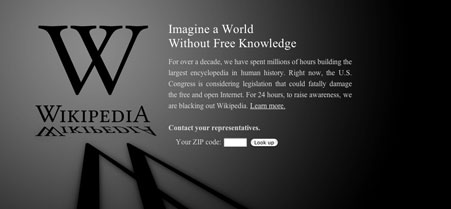SOPA blackouts: Free speech or 'abuse of power'?
 Wikipedia
Wikipedia
The unprecedented wave of "blackouts" and other forms of protest that swept the web on Wednesday was designed to call attention to legislation that critics contend will stifle free speech. But the dramatic move sparked debate over whether the protest itself was appropriate for websites that are often themselves arbiters of free speech online.
Among the thousands of lesser-known websites that blocked access to their content or posted statements against the House's Stop Online Piracy Act and its Senate counterpart, the Protect IP Act, were big names such as Wikipedia, Craigslist, and the online news aggregator Reddit.
But the names not on the list highlight a fine line for companies that depend on neutrality to maintain their credibility.
While they oppose the legislation, Yahoo, Facebook and Twitter, whose CEO called the blackouts "foolish," decided to sit the protest out.
Google, which is so sensitive to its neutral reputation that it recently punished itself after inappropriately promoting its own web browser, was among those taking a middle road. The search giant remained up and operating but blacked-out its logo and linked to a petition against the bills.
Supporters of the legislation, such as the Motion Picture Association of America, disputed not only the premise of the Internet companies' concerns, but the decision to visibly protest, and in some cases self-censor.
"It is an irresponsible response and a disservice to people who rely on them for information (or) use their services," said former Sen. Chris Dodd, D-Conn., president of the MPAA. "It is also an abuse of power given the freedoms these companies enjoy in the marketplace today."
The Wall Street Journal , whose owner, News Corporation, supports the bills, took a similar view, calling the protests a "cyber tantrum" by companies and organizations that feel "entitled" to content. The paper argued that the protests represent a double standard for websites that claim they are dedicated to free speech.
"How's that for irony: Companies supposedly devoted to the free flow of information are gagging themselves, and the only practical effect will be to enable fraudsters," wrote the newspaper's editorial board . "They've taken no comparable action against, say, Chinese repression."
And criticism of the protest came from some not necessarily in support of the controversial bills.
Some volunteer editors for Wikipedia expressed concern that the site's dramatic decision to block all access to its U.S. website could undermine its reputation for a "Neutral Point of View."
"My main concern is that it puts the organization in the role of advocacy, and that's a slippery slope," Michigan-based editor Robert Lawton told the Associated Press .
But the companies that joined the protest insisted they were well within their rights to speak up on an issue that affects them so directly.
"The encyclopedia will always be neutral. The community need not be, not when the encyclopedia is threatened," Wikipedia founder Jimmy Wales said on Twitter.
None of the organizations, companies, and websites that took part in Wednesday's protests damaged their credibility, said Matt Wood, policy director for the advocacy group Free Press, which blacked-out its website.
"Being an arbiter of information shouldn't handcuff an organization," he said.
And Rep. Darrell Issa , R-Calif., who has proposed a competing anti-piracy bill, praised the protesting sites for participating in democracy.
"I know suspending and changing access to sites was not necessarily an easy decision, but this a responsible and transparent exercise of freedom of speech," he said in a statement.
NEXT STORY: GAO: Health IT Contractor Lags





